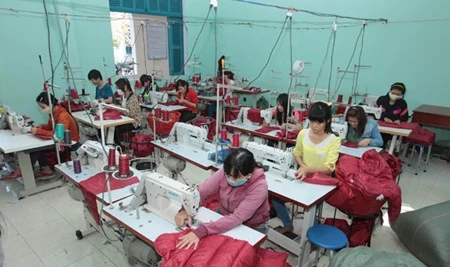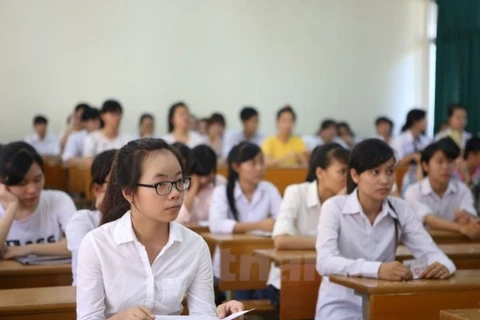Hanoi (VNA) - The news that reputed public schools in the capital city of Hanoi will increase their tuition fees further in the next academic year has made many parents worried.
Some reports say the hike in fees would take tuition fees to up to 100 times that of normal public schools in September, when the 2017-2018 begins.
The latest surge in fees has come after the Hanoi People’s Council approved a resolution late last year that empowers high-quality public schools at all levels to raise their tuition fees.
As planned, in the new school year, the maximum tuition fees will be 4.3 million VND (190 USD) for a student per month in high-quality kindergartens and primary schools; and 4.5 million VND (198 USD) in high-quality secondary and high schools.
In the previous academic year, 2016-17, the figures were 3.9 million VND (171 USD) and 4.1 million VND (180 USD) respectively, the Phu nu Viet Nam (Vietnamese Women) newspaper reported.
Meanwhile, it would cost just 55,000- 110,000 VND (2.5-5 USD) per student per month at all levels to study in a normal public school in Hanoi for the 2017-1018 academic year. Fees for the previous year were 45,000-70,000 VND (2-3 USD) for a student per month.
Nguyen Hoang Quan, a resident of the My Dinh Residential Area in Nam Tu Liem district, said his son was going to the 6th grade in the coming school year.
He was confused and had to deliberate a bit before deciding to register his son with the Nam Tu Liem Secondary School, the high-quality public school near his house.
Normally, children are encouraged to study at public schools near their houses as per the policy of the municipal Education and Training Department, if not parents had to do complicated procedures to register their children to other schools. Additionally, public schools would also give priority to children living near their locations first, then other children. The policy aims to reduce overloading situation at public schools in the city.
Therefore, Quan said although he already decided to let his son learn at Nam Tu Liem Secondary School but he still worried about the quality education of the school.
“I don’t know if the school’s quality matches the money I pay,” he said.
Another father of two children studying in two high-quality schools in Ha Dong district said he and his wife had lived very economically to save more money for covering their children’s tuition fees this year.
“The latest increase in tuition fees makes it even tougher for us,” he added.
Hoang Thu Hang of Dong Da district, a mother of a high-quality kindergarten school’s student, said she was already informed that the tuition fee of his son would be raised by about 200,000 VND (9 USD) each month for the new school year.
Although she knows the school her son studied in is already quite good, she wants further improvement in the quality of education, commensurate with the additional money being taken from parents, Hang said.
Former Deputy Minister of Education and Training Tran Xuan Nhi said the new tuition fees were too high, especially for high schools.
Nhi said the model of high-quality public schools should be designed to fit with the actual situation.
“I think the income of most local residents cannot match the new tuition fees,” he said.
The average income of a Hanoian is about 3,800 USD per year.
Nhi said the local department of education and training should make its calculations with greater care so that it can improve the quality of education for reasonable tuition fees.
It should let each school to decide its maximum tuition fees depending on their infrastructure and the quality of teachers instead of setting a maximum level of tuition fees for all schools, he said.
Hanoi now has 18 high-quality public schools at all levels. Under criteria of the local department of education and training, a school is defined as a high-quality one if it meets a range of standards on the quality of teachers, infrastructure and teaching methods.
For example, the school is required to have at least 70 percent of teachers with a certificate of English fluency issued by the Ministry of Educational and Training, equal to level A2 under the Common European Framework of Reference for Languages. It should have modern facilities in the classroom, labs, and kitchen as well as proper fire-fighting equipment. It should conduct more outdoor activities to improve students’ life skills and adopt teaching methods that encourage children to actively think for themselves.
The department said the establishment of high-quality schools was aimed to serve residents’ demand for high-quality education.
It plans to construct an additional of 20 high-quality public schools by 2020 to raise education quality in the city to regional levels.
The increase in tuition fees would continue in the coming years.
For the 2018-2019 school year, the maximum tuition fee will be 4.7 million VND (206 USD) for a student per month in kindergartens and primary schools and 4.9 million VND (215 USD) per month per student in secondary and high schools. Corresponding figures for 2019-2020 would be 5.1 million VND (224 USD) and 5.3 million VND (233 USD).-VNA
Some reports say the hike in fees would take tuition fees to up to 100 times that of normal public schools in September, when the 2017-2018 begins.
The latest surge in fees has come after the Hanoi People’s Council approved a resolution late last year that empowers high-quality public schools at all levels to raise their tuition fees.
As planned, in the new school year, the maximum tuition fees will be 4.3 million VND (190 USD) for a student per month in high-quality kindergartens and primary schools; and 4.5 million VND (198 USD) in high-quality secondary and high schools.
In the previous academic year, 2016-17, the figures were 3.9 million VND (171 USD) and 4.1 million VND (180 USD) respectively, the Phu nu Viet Nam (Vietnamese Women) newspaper reported.
Meanwhile, it would cost just 55,000- 110,000 VND (2.5-5 USD) per student per month at all levels to study in a normal public school in Hanoi for the 2017-1018 academic year. Fees for the previous year were 45,000-70,000 VND (2-3 USD) for a student per month.
Nguyen Hoang Quan, a resident of the My Dinh Residential Area in Nam Tu Liem district, said his son was going to the 6th grade in the coming school year.
He was confused and had to deliberate a bit before deciding to register his son with the Nam Tu Liem Secondary School, the high-quality public school near his house.
Normally, children are encouraged to study at public schools near their houses as per the policy of the municipal Education and Training Department, if not parents had to do complicated procedures to register their children to other schools. Additionally, public schools would also give priority to children living near their locations first, then other children. The policy aims to reduce overloading situation at public schools in the city.
Therefore, Quan said although he already decided to let his son learn at Nam Tu Liem Secondary School but he still worried about the quality education of the school.
“I don’t know if the school’s quality matches the money I pay,” he said.
Another father of two children studying in two high-quality schools in Ha Dong district said he and his wife had lived very economically to save more money for covering their children’s tuition fees this year.
“The latest increase in tuition fees makes it even tougher for us,” he added.
Hoang Thu Hang of Dong Da district, a mother of a high-quality kindergarten school’s student, said she was already informed that the tuition fee of his son would be raised by about 200,000 VND (9 USD) each month for the new school year.
Although she knows the school her son studied in is already quite good, she wants further improvement in the quality of education, commensurate with the additional money being taken from parents, Hang said.
Former Deputy Minister of Education and Training Tran Xuan Nhi said the new tuition fees were too high, especially for high schools.
Nhi said the model of high-quality public schools should be designed to fit with the actual situation.
“I think the income of most local residents cannot match the new tuition fees,” he said.
The average income of a Hanoian is about 3,800 USD per year.
Nhi said the local department of education and training should make its calculations with greater care so that it can improve the quality of education for reasonable tuition fees.
It should let each school to decide its maximum tuition fees depending on their infrastructure and the quality of teachers instead of setting a maximum level of tuition fees for all schools, he said.
Hanoi now has 18 high-quality public schools at all levels. Under criteria of the local department of education and training, a school is defined as a high-quality one if it meets a range of standards on the quality of teachers, infrastructure and teaching methods.
For example, the school is required to have at least 70 percent of teachers with a certificate of English fluency issued by the Ministry of Educational and Training, equal to level A2 under the Common European Framework of Reference for Languages. It should have modern facilities in the classroom, labs, and kitchen as well as proper fire-fighting equipment. It should conduct more outdoor activities to improve students’ life skills and adopt teaching methods that encourage children to actively think for themselves.
The department said the establishment of high-quality schools was aimed to serve residents’ demand for high-quality education.
It plans to construct an additional of 20 high-quality public schools by 2020 to raise education quality in the city to regional levels.
The increase in tuition fees would continue in the coming years.
For the 2018-2019 school year, the maximum tuition fee will be 4.7 million VND (206 USD) for a student per month in kindergartens and primary schools and 4.9 million VND (215 USD) per month per student in secondary and high schools. Corresponding figures for 2019-2020 would be 5.1 million VND (224 USD) and 5.3 million VND (233 USD).-VNA
VNA
























